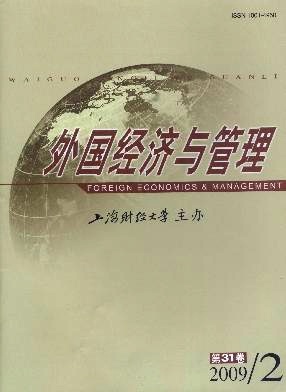家族企业内部冲突及其管理问题探讨
外国经济与管理 2009 年 第 31 卷第 02 期, 页码:58 - 64
摘要
参考文献
摘要
本文研究了家族企业目标冲突、过程冲突和关系冲突之间的内在关系及其对家族企业绩效的影响,发现这三种冲突同时存在于家族企业,但对企业绩效的影响各不相同,相互之间的作用关系并不确定;然后,在此基础上进一步分析了集权程度、代际传承和利他主义对家族企业三种冲突和绩效的影响;最后还对家族企业的冲突管理提出了框架性建议。
[1]Lansberg,I S.Managing human resources in family firms:The problem of institutional overlap[J].Organizational Dynamics,1983,12(1):39-46.
[2]Ritch L Sorenson.Conflict management strategies and family and business outcomes in family businesses[R].BNEI Working Paper,1995.
[3]Lubatkin,M,Schulze,W S,Ling,Y,and Dino,R.The effects of parental altruism on the governance of family-managed firms[J].Or-ganization Behavior,2005,26(3):313-330
[4]Dunn,B.Success themes in Scottish family businesses:Philosophies and practices through the generations[J].Family Business Re-view,1995,8(1):17-28.
[5]Jehn,K A.A multimethod examination of the benefits and detriments of intragroup conflict[J].Administrative Science Quarterly,1995,40(2):256-282.
[6]Jehn,K A.A quantitative analysis of conflict types and dimensions in organizational groups[J].Administrative Science Quarterly,1997b,42(3):530-558.
[7]Kellermanns,F W,and Eddleston,K.Feuding families:When conflict does a family firm good[J].Entrepreneurship Theory and Prac-tice,2004,28(3):209-228.
[8]Kellermanns,F W,and Eddleston,K.A family perspective on when conflict benefits family firm performance[J].Journal of BusinessResearch,2007,60(10):1 048-1 057.
[9]Jehn,K A,and Mannix,E A.The dynamic nature of conflict:A longitudinal study of intragroup conflict and group performance[J].A-cademy of Management Journal,2001,44(2):238-251.
[10]Simons,T L,and Peterson,R S.Task conflict and relationship conflict in top management teams:The pivotal role of intragroup trust[J].Journal of Applied Psychology,2000,85(1):102-111.
[11]Dooley,R S,Fryxell,G E,and Judge,W Q.Belaboring the not-so-obvious:Consensus,commitment,and strategy implementationspeed and success[J].Journal of Management,2000,26(6):1 237-1 257.
[12]de Dreu,C K W,and Van Kleef,G A.The influence on information search,impression formation and demands in negotiation[J].Jour-nal of Experimental Social Psychology,2004,40(3):303-319.
[13]Schulze,W S,Lubatkin M H,Ling,Y,Dino,R N and Buchholtz,A K.Agency relationships in family firms:Theory and evidence[J].Organization Science,2001,12(2):99-116
[14]Cabrera-Suarez,K,Saa-Perez,P D,and Almeida,D G.The succession process from a resource-and knowledge-based view of the familyfirm[J].Family Business Review,2001,14(1):37-47.
[15]Stark,O,and Falk,I.Transfers,empathy formation,and reverse transfers[J].American Economic Review,1995,88(2):271-276.
[16]Carlock,R S,and Ward,J L.Strategic planning for the family and business parallel planning to unify the family and business[M].New York:Palgrave Macmillan,2001.
[17]Spector,B.The family business conflict resolution handbook[M].Philadelphia:MLR Holding LLC,2005.
[2]Ritch L Sorenson.Conflict management strategies and family and business outcomes in family businesses[R].BNEI Working Paper,1995.
[3]Lubatkin,M,Schulze,W S,Ling,Y,and Dino,R.The effects of parental altruism on the governance of family-managed firms[J].Or-ganization Behavior,2005,26(3):313-330
[4]Dunn,B.Success themes in Scottish family businesses:Philosophies and practices through the generations[J].Family Business Re-view,1995,8(1):17-28.
[5]Jehn,K A.A multimethod examination of the benefits and detriments of intragroup conflict[J].Administrative Science Quarterly,1995,40(2):256-282.
[6]Jehn,K A.A quantitative analysis of conflict types and dimensions in organizational groups[J].Administrative Science Quarterly,1997b,42(3):530-558.
[7]Kellermanns,F W,and Eddleston,K.Feuding families:When conflict does a family firm good[J].Entrepreneurship Theory and Prac-tice,2004,28(3):209-228.
[8]Kellermanns,F W,and Eddleston,K.A family perspective on when conflict benefits family firm performance[J].Journal of BusinessResearch,2007,60(10):1 048-1 057.
[9]Jehn,K A,and Mannix,E A.The dynamic nature of conflict:A longitudinal study of intragroup conflict and group performance[J].A-cademy of Management Journal,2001,44(2):238-251.
[10]Simons,T L,and Peterson,R S.Task conflict and relationship conflict in top management teams:The pivotal role of intragroup trust[J].Journal of Applied Psychology,2000,85(1):102-111.
[11]Dooley,R S,Fryxell,G E,and Judge,W Q.Belaboring the not-so-obvious:Consensus,commitment,and strategy implementationspeed and success[J].Journal of Management,2000,26(6):1 237-1 257.
[12]de Dreu,C K W,and Van Kleef,G A.The influence on information search,impression formation and demands in negotiation[J].Jour-nal of Experimental Social Psychology,2004,40(3):303-319.
[13]Schulze,W S,Lubatkin M H,Ling,Y,Dino,R N and Buchholtz,A K.Agency relationships in family firms:Theory and evidence[J].Organization Science,2001,12(2):99-116
[14]Cabrera-Suarez,K,Saa-Perez,P D,and Almeida,D G.The succession process from a resource-and knowledge-based view of the familyfirm[J].Family Business Review,2001,14(1):37-47.
[15]Stark,O,and Falk,I.Transfers,empathy formation,and reverse transfers[J].American Economic Review,1995,88(2):271-276.
[16]Carlock,R S,and Ward,J L.Strategic planning for the family and business parallel planning to unify the family and business[M].New York:Palgrave Macmillan,2001.
[17]Spector,B.The family business conflict resolution handbook[M].Philadelphia:MLR Holding LLC,2005.
引用本文
王明琳, 周生春. 家族企业内部冲突及其管理问题探讨[J]. 外国经济与管理, 2009, 31(2): 58–64.
导出参考文献,格式为:
上一篇:基于过程视角的家族创业研究
下一篇:组织内领地性研究前沿探析





 6126
6126  263
263

